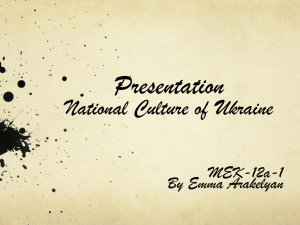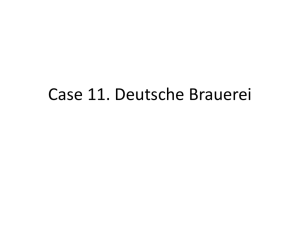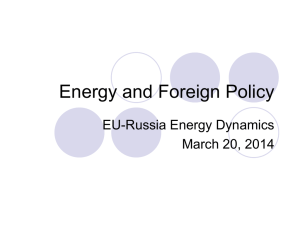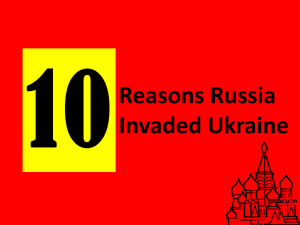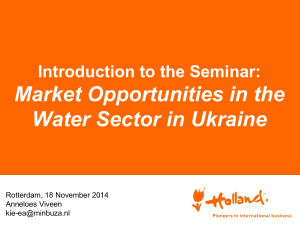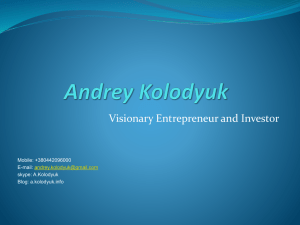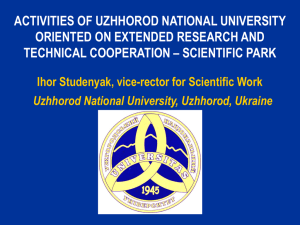DOC - Europa
advertisement
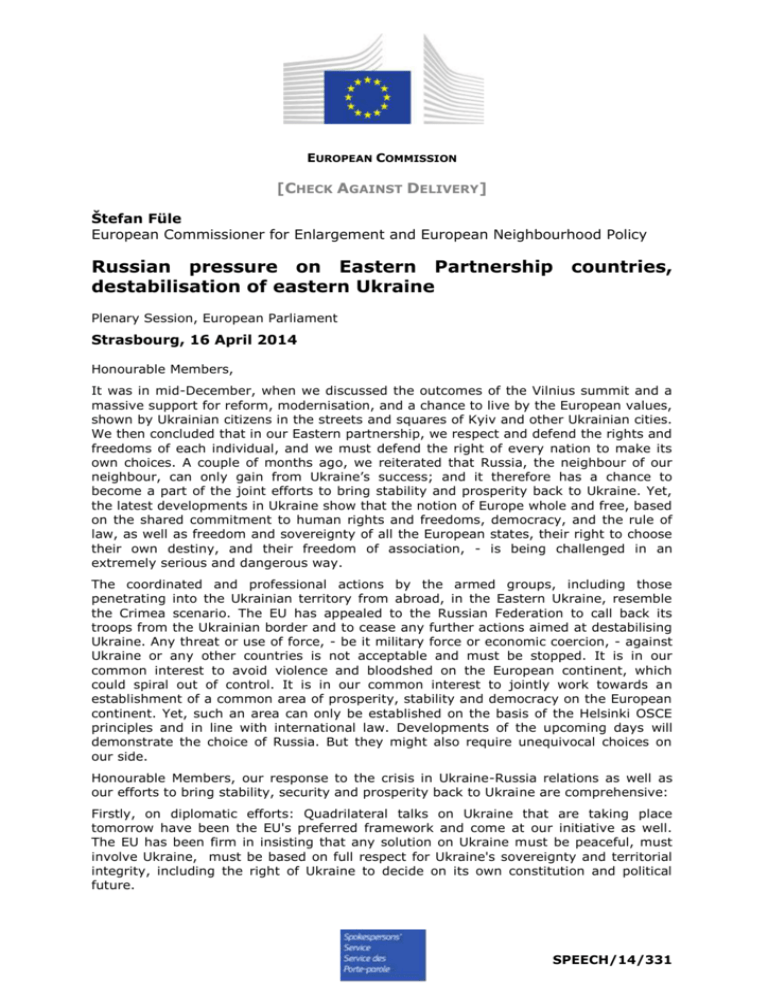
EUROPEAN COMMISSION [CHECK AGAINST DELIVERY] Štefan Füle European Commissioner for Enlargement and European Neighbourhood Policy Russian pressure on Eastern Partnership destabilisation of eastern Ukraine countries, Plenary Session, European Parliament Strasbourg, 16 April 2014 Honourable Members, It was in mid-December, when we discussed the outcomes of the Vilnius summit and a massive support for reform, modernisation, and a chance to live by the European values, shown by Ukrainian citizens in the streets and squares of Kyiv and other Ukrainian cities. We then concluded that in our Eastern partnership, we respect and defend the rights and freedoms of each individual, and we must defend the right of every nation to make its own choices. A couple of months ago, we reiterated that Russia, the neighbour of our neighbour, can only gain from Ukraine’s success; and it therefore has a chance to become a part of the joint efforts to bring stability and prosperity back to Ukraine. Yet, the latest developments in Ukraine show that the notion of Europe whole and free, based on the shared commitment to human rights and freedoms, democracy, and the rule of law, as well as freedom and sovereignty of all the European states, their right to choose their own destiny, and their freedom of association, - is being challenged in an extremely serious and dangerous way. The coordinated and professional actions by the armed groups, including those penetrating into the Ukrainian territory from abroad, in the Eastern Ukraine, resemble the Crimea scenario. The EU has appealed to the Russian Federation to call back its troops from the Ukrainian border and to cease any further actions aimed at destabilising Ukraine. Any threat or use of force, - be it military force or economic coercion, - against Ukraine or any other countries is not acceptable and must be stopped. It is in our common interest to avoid violence and bloodshed on the European continent, which could spiral out of control. It is in our common interest to jointly work towards an establishment of a common area of prosperity, stability and democracy on the European continent. Yet, such an area can only be established on the basis of the Helsinki OSCE principles and in line with international law. Developments of the upcoming days will demonstrate the choice of Russia. But they might also require unequivocal choices on our side. Honourable Members, our response to the crisis in Ukraine-Russia relations as well as our efforts to bring stability, security and prosperity back to Ukraine are comprehensive: Firstly, on diplomatic efforts: Quadrilateral talks on Ukraine that are taking place tomorrow have been the EU's preferred framework and come at our initiative as well. The EU has been firm in insisting that any solution on Ukraine must be peaceful, must involve Ukraine, must be based on full respect for Ukraine's sovereignty and territorial integrity, including the right of Ukraine to decide on its own constitution and political future. SPEECH/14/331 The High Representative/Vice-President Cathy Ashton has been very closely engaged, leading these efforts on the EU side. She will meet the Foreign Ministers of the US, the Russian Federation and Ukraine in Geneva tomorrow in an attempt to de-escalate the crisis and to engage Russia in a forward looking process. Given the complex situation in Ukraine it is a considerable success that these international talks take place. The EU has also strongly supported the establishment of an OSCE Special Monitoring Mission. It is doing a very valuable work on the ground in the Eastern regions. The EU has and will continue providing actual substantial assistance to the mission to ensure that it can carry out its mandate in the best possible way. Furthermore, at the last Foreign Affairs Council, an important step was also taken towards a possible CSDP mission. Secondly, the EU has taken a firm and united stance after the illegal annexation of Crimea by Russia, including sanctions against individuals responsible for undermining the territorial integrity of Ukraine. Condemning the actions undertaken by armed individuals in cities of Eastern Ukraine, the EU has decided to further expand the list of those subject to assets freeze and visa ban. These measures can gradually be enlarged to a broad range of economic areas should Russia continue to destabilise Ukraine. Thirdly, the EU has not recognised illegal annexation of Crimea, and is working to establish practical parameters of this non-recognition policy. Fourthly, the EU is firmly committed to providing strong political and financial backing to Ukraine. On 21 March we signed the political chapters of the Association Agreement and we have just adopted a set of unilateral trade measures that will open the European Union's door to exports from Ukraine. We remain committed to conclude the signature procedure of the remaining chapters of the Association Agreement as soon as possible after the May 25 Presidential elections. At the end of March I was in Kyiv with Commissioner Lewandowski and several Directors-General of the Commission to agree on a joint plan. We have moved fast on this, and last week the European Commission created a Support Group which will help Ukraine to implement this plan a “European agenda for reform”, which lists the political and economic reforms we agreed with Ukraine based on their needs. Clear progress has been made already on the financial front: the FAC adopted on Monday the decision on the EUR 1 billion macro financial assistance programme. Another issue of critical importance is energy security. The letter by President Putin to eighteen member states and five partner countries illustrates well just how important this issue is. The EU will respond jointly to the letter, in order to agree on consultations with Russia and Ukraine with a view to ensuring security of supply and transit. Allow me to emphasise: our relations with Russia in the energy are those of mutual interdependence. The EU is the largest market for the Russian gas and oil. In reaction to recent developments, the European Commission will, as requested by the European Council, conduct an in-depth study of EU energy security and will present a comprehensive plan for the reduction of EU energy dependence. We are committed to facilitate an agreement between the Slovak and Ukrainian gas operators on the reverse flow. Moreover, the Ukrainian government is aware of the need to reform the energy sector, in line with the Energy Community commitments and displays determination to commence these reforms. 2 Honourable Members, While Ukraine is naturally in the centre of our attention, we are likewise following the situation very closely in Moldova and Georgia – political developments in both countries need to be watched carefully as we prepare for the signature and implementation of AA/DCFTAs, and given the existing external vulnerabilities. We are increasing our political engagement, including with high level visits of Presidents van Rompuy and Barroso. The European Commission has also invited the Ukrainian, Moldovan and Georgian Governments to Brussels in May. We should note the unprecedented speed with which the procedures of bringing the AA/DCFTAs with Moldova and Georgia have been completed: the time has been cut by more than 2/3, enabling us to sign the Agreements already in June. Moreover, visa liberalisation with Moldova will take effect in only a couple of days, on 28 April – this is a key achievement bringing clear benefits to the entire population. In parallel, we encourage Georgia and the Republic of Moldova to continue implementing reforms as part of their commitment to further strengthen the political association and economic integration with the EU. Closing remarks Honourable Members, We have never been striving to create new dividing lines in Europe, - quite on the contrary, our offer to work with our Eastern European partners and Russia, who is our neighbour, but also a neighbour of our neighbours, towards establishing a common area of prosperity, stability and democracy on our continent - is standing. We have used numerous occasions to dispel the ‘zero-sum’ logic and clarify to Russia that the Association Agreements with the Eastern European partners will not harm Russian economic interests, - quite on the contrary, the Russian business will gain. Yet, we are facing at the moment the most serious crisis in Europe since the end of the World War II. We are witnessing economic coercion, threats and a covert action to instigate protests and instability, which are meant to dissuade the Ukrainian people from taking up new opportunities, but also meant to dissuade us from defending their freedom of choice, to convince us to drop our policies, values and principles, and accept the logic of the spheres of influence. But this would equal to ignoring the lessons of the last century in this continent. I do believe that it is time to show an even stronger, more determined, and resolute commitment to the Eastern Partnership. The people of Ukraine, its independence and sovereignty should not become victims of geopolitical zero-sum games. We will always support and stand by those who are subject to undue pressures. The main principle of the Eastern Partnership is that we engage on the basis of common values – the respect for and the promotion of human rights and freedoms, democracy, and the rule of law. Reflecting on your debate let me mention two issues I am concerned about: The first one is Russian propaganda: it is more aggressive than at the time of the Cold War and it is also more dangerous because it is not contained anymore by the Iron Curtain of the Cold War as there are not contained its effects and implications and we need more objective information, like the one you have mentioned yourself - the very recent report by the Office of the High Commissioner for Human Rights of the United Nations underlining that the misinformation, propaganda and incitement to hatred need to be urgently countered. And we need also to be strong and clear on the basis of our values and principles and resolute in defending them. 3 And talking about the principles brings me to the second point – it has been mentioned in our debate that the Cold War has not ended with a peace treaty – yes I agree, it has not – it has ended in a much more appropriate way. It has freed and empowered those behind the Iron Curtain to make a free choice about their future, it has reunited Europe in an unprecedented way creating the conditions for peace, stability and prosperity throughout the whole continent. Honourable Members our Eastern European partners have had their rocky past, they deserve a different future, no one should doubt the importance of our Eastern European partners for our future. Thank you very much for your attention. 4

